新标准大学英语3 课后翻译1-5单元(中英对照)
- 格式:docx
- 大小:29.36 KB
- 文档页数:13
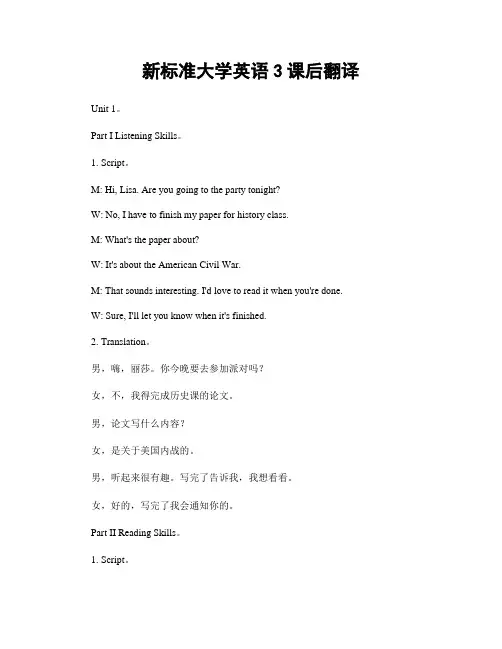
新标准大学英语3课后翻译Unit 1。
Part I Listening Skills。
1. Script。
M: Hi, Lisa. Are you going to the party tonight?W: No, I have to finish my paper for history class.M: What's the paper about?W: It's about the American Civil War.M: That sounds interesting. I'd love to read it when you're done. W: Sure, I'll let you know when it's finished.2. Translation。
男,嗨,丽莎。
你今晚要去参加派对吗?女,不,我得完成历史课的论文。
男,论文写什么内容?女,是关于美国内战的。
男,听起来很有趣。
写完了告诉我,我想看看。
女,好的,写完了我会通知你的。
Part II Reading Skills。
1. Script。
M: Hi, Sarah. Have you finished reading the novel for our literature class?W: Yes, I finished it yesterday. It's a really good book.M: I'm only halfway through. I need to catch up before our next class.W: You should read a few chapters every day to stay on track.M: Yeah, I'll do that. Thanks for the advice.2. Translation。
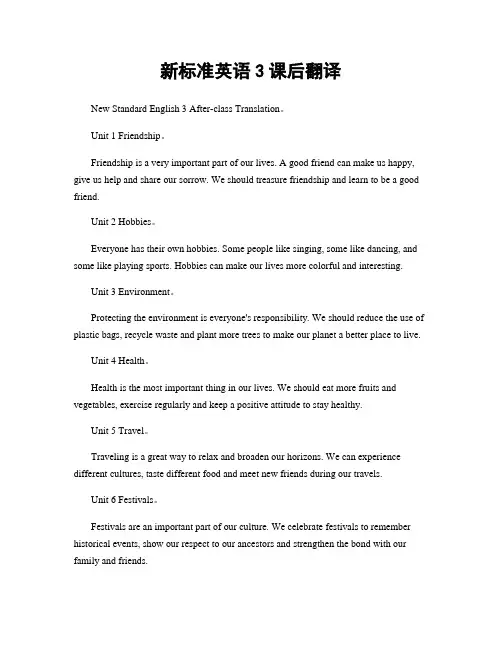
新标准英语3课后翻译New Standard English 3 After-class Translation。
Unit 1 Friendship。
Friendship is a very important part of our lives. A good friend can make us happy, give us help and share our sorrow. We should treasure friendship and learn to be a good friend.Unit 2 Hobbies。
Everyone has their own hobbies. Some people like singing, some like dancing, and some like playing sports. Hobbies can make our lives more colorful and interesting.Unit 3 Environment。
Protecting the environment is everyone's responsibility. We should reduce the use of plastic bags, recycle waste and plant more trees to make our planet a better place to live.Unit 4 Health。
Health is the most important thing in our lives. We should eat more fruits and vegetables, exercise regularly and keep a positive attitude to stay healthy.Unit 5 Travel。
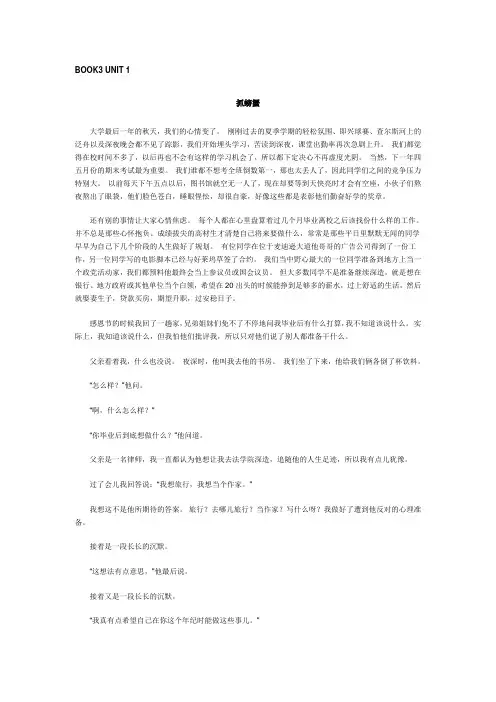
BOOK3 UNIT 1抓螃蟹大学最后一年的秋天,我们的心情变了。
刚刚过去的夏季学期的轻松氛围、即兴球赛、查尔斯河上的泛舟以及深夜晚会都不见了踪影,我们开始埋头学习,苦读到深夜,课堂出勤率再次急剧上升。
我们都觉得在校时间不多了,以后再也不会有这样的学习机会了,所以都下定决心不再虚度光阴。
当然,下一年四五月份的期末考试最为重要。
我们谁都不想考全班倒数第一,那也太丢人了,因此同学们之间的竞争压力特别大。
以前每天下午五点以后,图书馆就空无一人了,现在却要等到天快亮时才会有空座,小伙子们熬夜熬出了眼袋,他们脸色苍白,睡眼惺忪,却很自豪,好像这些都是表彰他们勤奋好学的奖章。
还有别的事情让大家心情焦虑。
每个人都在心里盘算着过几个月毕业离校之后该找份什么样的工作。
并不总是那些心怀抱负、成绩拔尖的高材生才清楚自己将来要做什么,常常是那些平日里默默无闻的同学早早为自己下几个阶段的人生做好了规划。
有位同学在位于麦迪逊大道他哥哥的广告公司得到了一份工作,另一位同学写的电影脚本已经与好莱坞草签了合约。
我们当中野心最大的一位同学准备到地方上当一个政党活动家,我们都预料他最终会当上参议员或国会议员。
但大多数同学不是准备继续深造,就是想在银行、地方政府或其他单位当个白领,希望在20出头的时候能挣到足够多的薪水,过上舒适的生活,然后就娶妻生子,贷款买房,期望升职,过安稳日子。
感恩节的时候我回了一趟家,兄弟姐妹们免不了不停地问我毕业后有什么打算,我不知道该说什么。
实际上,我知道该说什么,但我怕他们批评我,所以只对他们说了别人都准备干什么。
父亲看着我,什么也没说。
夜深时,他叫我去他的书房。
我们坐了下来,他给我们俩各倒了杯饮料。
“怎么样?”他问。
“啊,什么怎么样?”“你毕业后到底想做什么?”他问道。
父亲是一名律师,我一直都认为他想让我去法学院深造,追随他的人生足迹,所以我有点儿犹豫。
过了会儿我回答说:“我想旅行,我想当个作家。
”我想这不是他所期待的答案。

新标准大学英语3课文翻译Unit 1 Friendship。
Part I Pre-reading Task。
1. The text is about friendship and the importance of friendship in our lives.2. The text is likely to discuss the qualities of a good friend and the benefits of having good friends.3. I think the text will be interesting and informative, and it will provide insights into the value of friendship.Part II Text A。
Friendship。
Friendship is one of the most precious things in our lives. It is a relationship that brings joy and support, and it is something that many people cherish deeply. Friends are the people we can rely on, share our thoughts and feelings with, and have fun with. A good friend is someone who is there for you in times of need, who listens to you without judgment, and who understands you even when you don't say a word.Part III Text B。
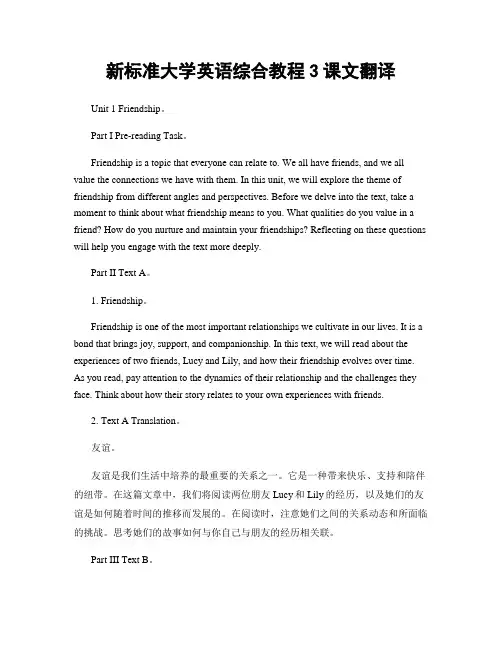
新标准大学英语综合教程3课文翻译Unit 1 Friendship。
Part I Pre-reading Task。
Friendship is a topic that everyone can relate to. We all have friends, and we all value the connections we have with them. In this unit, we will explore the theme of friendship from different angles and perspectives. Before we delve into the text, take a moment to think about what friendship means to you. What qualities do you value in a friend? How do you nurture and maintain your friendships? Reflecting on these questions will help you engage with the text more deeply.Part II Text A。
1. Friendship。
Friendship is one of the most important relationships we cultivate in our lives. It is a bond that brings joy, support, and companionship. In this text, we will read about the experiences of two friends, Lucy and Lily, and how their friendship evolves over time. As you read, pay attention to the dynamics of their relationship and the challenges they face. Think about how their story relates to your own experiences with friends.2. Text A Translation。
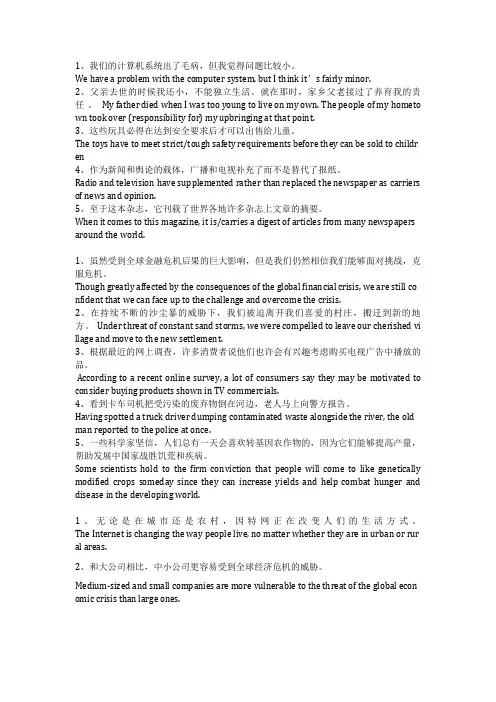
1、我们的计算机系统出了毛病,但我觉得问题比较小。
We have a problem with the computer system, but I think it’s fairly minor.2、父亲去世的时候我还小,不能独立生活。
就在那时,家乡父老接过了养育我的责任。
My father died when I was too young to live on my own. The people of my hometo wn took over (responsibility for) my upbringing at that point.3、这些玩具必得在达到安全要求后才可以出售给儿童。
The toys have to meet strict/tough safety requirements before they can be sold to childr en4、作为新闻和舆论的载体,广播和电视补充了而不是替代了报纸。
Radio and television have supplemented rather than replaced the newspaper as carriers of news and opinion.5、至于这本杂志,它刊载了世界各地许多杂志上文章的摘要。
When it comes to this magazine, it is/carries a digest of articles from many newspapers around the world.1、虽然受到全球金融危机后果的巨大影响,但是我们仍然相信我们能够面对挑战,克服危机。
Though greatly affected by the consequences of the global financial crisis, we are still co nfident that we can face up to the challenge and overcome the crisis.2、在持续不断的沙尘暴的威胁下,我们被迫离开我们喜爱的村庄,搬迁到新的地方。
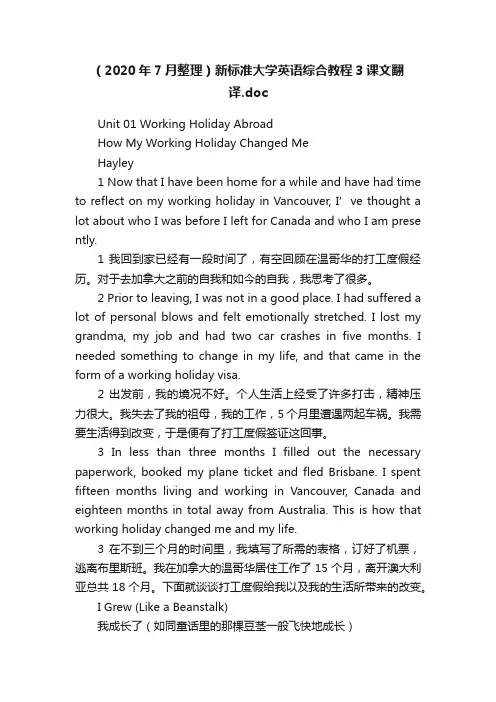
(2020年7月整理)新标准大学英语综合教程3课文翻译.docUnit 01 Working Holiday AbroadHow My Working Holiday Changed MeHayley1 Now that I have been home for a while and have had time to reflect on my working holiday in Vancouver, I’ve thought a lot about who I was before I left for Canada and who I am prese ntly.1 我回到家已经有一段时间了,有空回顾在温哥华的打工度假经历。
对于去加拿大之前的自我和如今的自我,我思考了很多。
2 Prior to leaving, I was not in a good place. I had suffered a lot of personal blows and felt emotionally stretched. I lost my grandma, my job and had two car crashes in five months. I needed something to change in my life, and that came in the form of a working holiday visa.2 出发前,我的境况不好。
个人生活上经受了许多打击,精神压力很大。
我失去了我的祖母,我的工作,5个月里遭遇两起车祸。
我需要生活得到改变,于是便有了打工度假签证这回事。
3 In less than three months I filled out the necessary paperwork, booked my plane ticket and fled Brisbane. I spent fifteen months living and working in Vancouver, Canada and eighteen months in total away from Australia. This is how that working holiday changed me and my life.3 在不到三个月的时间里,我填写了所需的表格,订好了机票,逃离布里斯班。
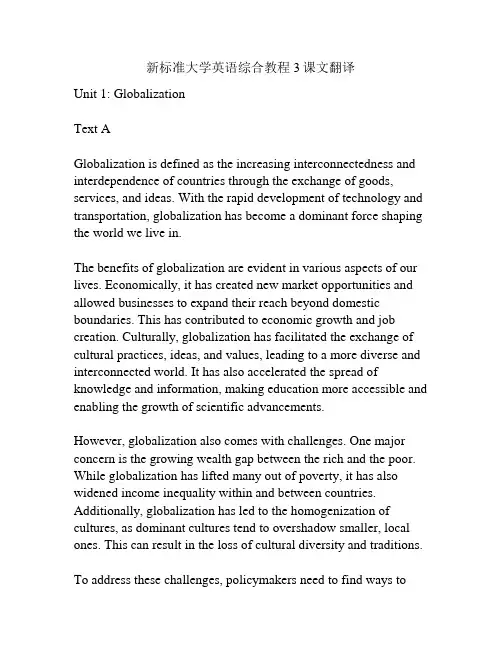
新标准大学英语综合教程3课文翻译Unit 1: GlobalizationText AGlobalization is defined as the increasing interconnectedness and interdependence of countries through the exchange of goods, services, and ideas. With the rapid development of technology and transportation, globalization has become a dominant force shaping the world we live in.The benefits of globalization are evident in various aspects of our lives. Economically, it has created new market opportunities and allowed businesses to expand their reach beyond domestic boundaries. This has contributed to economic growth and job creation. Culturally, globalization has facilitated the exchange of cultural practices, ideas, and values, leading to a more diverse and interconnected world. It has also accelerated the spread of knowledge and information, making education more accessible and enabling the growth of scientific advancements.However, globalization also comes with challenges. One major concern is the growing wealth gap between the rich and the poor. While globalization has lifted many out of poverty, it has also widened income inequality within and between countries. Additionally, globalization has led to the homogenization of cultures, as dominant cultures tend to overshadow smaller, local ones. This can result in the loss of cultural diversity and traditions. To address these challenges, policymakers need to find ways toensure that the benefits of globalization are shared by all. This includes implementing fair trade practices, promoting sustainable development, and investing in education and healthcare. Furthermore, it is crucial to celebrate and preserve cultural diversity, respecting and valuing the unique contributions of different societies.In conclusion, globalization has drastically transformed the world we live in, bringing both benefits and challenges. By addressing these challenges head-on, we can create a more inclusive and sustainable global community that embraces diversity and promotes shared prosperity.Text BOver the past few decades, globalization has become an undeniable reality in our society. It is driven by factors such as advancements in technology, international trade, and the rapid flow of capital and information.Globalization has had a profound impact on the economy, politics, culture, and daily life of people around the world. Economically, it has allowed businesses to expand their operations globally, leading to increased trade and investment. Politically, it has fostered cooperation among nations and encouraged the formation of international organizations and agreements. Culturally, globalization has facilitated the exchange of ideas, art, music, and cuisine, resulting in a more interconnected and multicultural world. In our daily lives, globalization has made it easier for us to travel, communicate, and access products and services from differentparts of the world.However, globalization has also faced criticism and resistance. Critics argue that it often benefits multinational corporations and developed countries at the expense of developing nations and local communities. They claim that globalization promotes exploitation, weakens labor rights, and leads to the loss of traditional industries and jobs.Despite the challenges and criticisms, it is clear that globalization is here to stay. As our world becomes increasingly interconnected, it is essential to find ways to maximize its benefits while mitigating its negative effects. This requires strong international cooperation and policies that promote sustainable and inclusive growth.In conclusion, globalization is a complex and multifaceted phenomenon that has significantly shaped our world. While it has brought about many positive changes, it also poses challenges that need to be addressed. Only through effective governance and cooperation can we harness the potential of globalization for the betterment of all.。
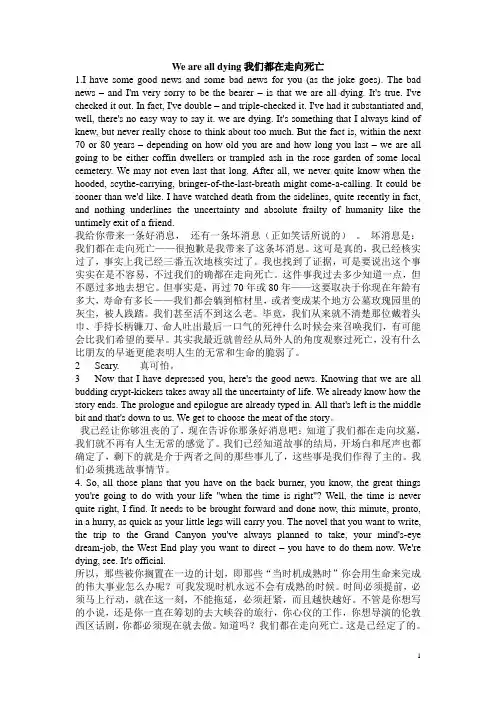
We are all dying我们都在走向死亡1.I have some good news and some bad news for you (as the joke goes). The bad news – and I'm very sorry to be the bearer – is that we are all dying. It's true. I've checked it out. In fact, I've double – and triple-checked it. I've had it substantiated and, well, there's no easy way to say it. we are dying. It's something that I always kind of knew, but never really chose to think about too much. But the fact is, within the next 70 or 80 years – depending on how old you are and how long you last – we are all going to be either coffin dwellers or trampled ash in the rose garden of some local cemetery. We may not even last that long. After all, we never quite know when the hooded, scythe-carrying, bringer-of-the-last-breath might come-a-calling. It could be sooner than we'd like. I have watched death from the sidelines, quite recently in fact, and nothing underlines the uncertainty and absolute frailty of humanity like the untimely exit of a friend.我给你带来一条好消息,还有一条坏消息(正如笑话所说的)。
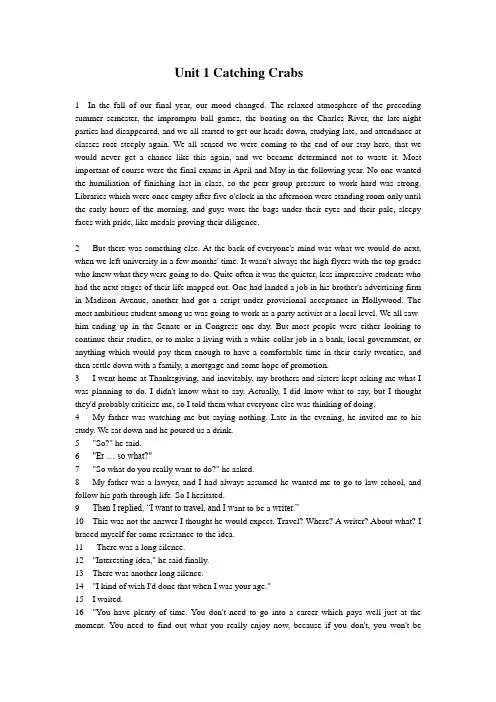
Unit 1 Catching Crabs1 In the fall of our final year, our mood changed. The relaxed atmosphere of the preceding summer semester, the impromptu ball games, the boating on the Charles River, the late-night parties had disappeared, and we all started to get our heads down, studying late, and attendance at classes rose steeply again. We all sensed we were coming to the end of our stay here, that we would never get a chance like this again, and we became determined not to waste it. Most important of course were the final exams in April and May in the following year. No one wanted the humiliation of finishing last in class, so the peer group pressure to work hard was strong. Libraries which were once empty after five o'clock in the afternoon were standing room only until the early hours of the morning, and guys wore the bags under their eyes and their pale, sleepy faces with pride, like medals proving their diligence.2 But there was something else. At the back of everyone's mind was what we would do next, when we left university in a few months' time. It wasn't always the high flyers with the top grades who knew what they were going to do. Quite often it was the quieter, less impressive students who had the next stages of their life mapped out. One had landed a job in his brother's advertising firm in Madison Avenue, another had got a script under provisional acceptance in Hollywood. The most ambitious student among us was going to work as a party activist at a local level. We all saw him ending up in the Senate or in Congress one day. But most people were either looking to continue their studies, or to make a living with a white-collar job in a bank, local government, or anything which would pay them enough to have a comfortable time in their early twenties, and then settle down with a family, a mortgage and some hope of promotion.3 I went home at Thanksgiving, and inevitably, my brothers and sisters kept asking me what I was planning to do. I didn't know what to say. Actually, I did know what to say, but I thought they'd probably criticize me, so I told them what everyone else was thinking of doing.4 My father was watching me but saying nothing. Late in the evening, he invited me to his study. We sat down and he poured us a drink.5 "So?" he said.6 "Er … so what?"7 "So what do you really want to do?" he asked.8 My father was a lawyer, and I had always assumed he wanted me to go to law school, and follow his path through life. So I hesitated.9 Then I replied, “I want to travel, and I w ant to be a writer.”10 This was not the answer I thought he would expect. Travel? Where? A writer? About what? I braced myself for some resistance to the idea.11 There was a long silence.12 "Interesting idea," he said finally.13 There was another long silence.14 "I kind of wish I'd done that when I was your age."15 I waited.16 "You have plenty of time. You don't need to go into a career which pays well just at the moment. You need to find out what you really enjoy now, because if you don't, you won't besuccessful later."17 "So how do I do this?“18 He thought for a moment. Then he said, "Look, it's late. Let's take the boat out tomorrow morning, just you and me. Maybe we can catch some crabs for dinner, and we can talk more."19 It was a small motor boat, moored ten minutes away, and my father had owned it for years. Early next morning we set off along the estuary. We didn't talk much, but enjoyed the sound of the seagulls and the sight of the estuary coastline and the sea beyond.20 There was no surf on the coastal waters at that time of day, so it was a smooth half-hour ride until my father switched off the motor. "Let's see if we get lucky," he said, picked up a rusty, mesh basket with a rope attached and threw it into the sea.21 We waited a while, then my father stood up and said, "Give me a hand with this," and we hauled up the crab cage onto the deck.22 Crabs fascinated me. They were so easy to catch. It wasn't just that they crawled into such an obvious trap, through a small hole in the lid of the basket, but it seemed as if they couldn't be bothered to crawl out again even when you took the lid off. They just sat there, waving their claws at you.23 The cage was brimming with dozens of soft shell crabs, piled high on top of each other. "Why don't they try to escape?" I wondered aloud to my father.24 "Just watch them for a moment. Look at that one, there! He's trying to climb out, but every time the other crabs pull him back in," said my father.25 And we watched. The crab climbed up the mesh towards the lid, and sure enough, just as it reached the top, one of its fellow crabs reached out, clamped its claw onto any available leg, and pulled it back. Several times the crab tried to defy his fellow captives, without luck.26 "Now watch!" said my father. "He's starting to get bored with this game."27 Not only did the crab give up its lengthy struggle to escape, but it actually began to help stop other crabs trying to escape. He'd finally chosen an easy way of life.28 Suddenly I understood why my father had suggested catching crabs that morning. He looked at me. "Don't get pulled back by the others," he said. "Spend some time figuring out who you are and what you want in life. Look back at the classes you're taking, and think about which ones were most productive for you personally. Then think about what's really important to you, what really interests you, what skills you have. Try to figure out where you want to live, where you want to go, what you want to earn, how you want to work. And if you can't answer these questions now, then take some time to find out. Because if you don't, you'll never be happy."29 He paused.30 "So you want to travel?" he asked.31 "Yes," I replied.32 "Better get you a passport. And you want to be a writer?"33 "I think so."34 "Interesting choice. We've never had a writer in the family," he said.35 My father started the motor and we set off back home.抓螃蟹1 大学最后一年的秋天,我们的心情变了。
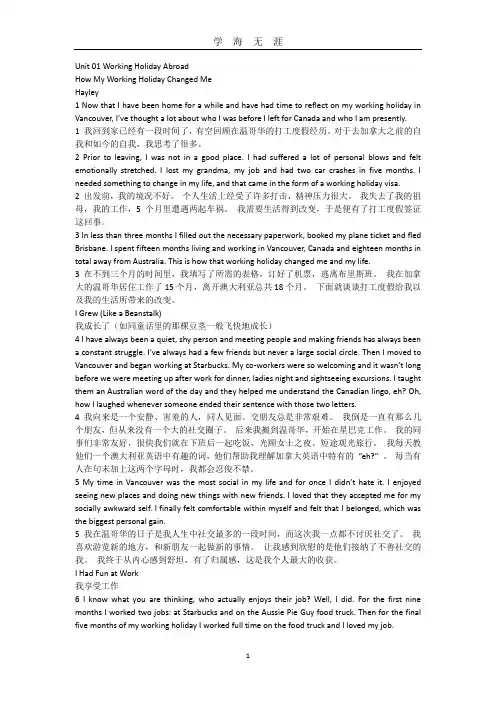
Unit 01 Working Holiday AbroadHow My Working Holiday Changed MeHayley1 Now that I have been home for a while and have had time to reflect on my working holiday in Vancouver, I’ve thought a lot about who I was before I left for Canada and who I am prese ntly.1 我回到家已经有一段时间了,有空回顾在温哥华的打工度假经历。
对于去加拿大之前的自我和如今的自我,我思考了很多。
2 Prior to leaving, I was not in a good place. I had suffered a lot of personal blows and felt emotionally stretched. I lost my grandma, my job and had two car crashes in five months. I needed something to change in my life, and that came in the form of a working holiday visa.2 出发前,我的境况不好。
个人生活上经受了许多打击,精神压力很大。
我失去了我的祖母,我的工作,5个月里遭遇两起车祸。
我需要生活得到改变,于是便有了打工度假签证这回事。
3 In less than three months I filled out the necessary paperwork, booked my plane ticket and fled Brisbane. I spent fifteen months living and working in Vancouver, Canada and eighteen months in total away from Australia. This is how that working holiday changed me and my life.3 在不到三个月的时间里,我填写了所需的表格,订好了机票,逃离布里斯班。
新标准大学英语3 课后翻译〔中英对照〕:Unit1:英译汉:1 、We all sensed we were coming to the end of our stay here, that we would never get a chance like this again, and we became determined not to waste it. Most important of course were the final exams in April and May in the following year. No one wanted the humiliation of finishing last in class, so the peer group pressure to work hard was strong. Libraries which were once empty after five o’clock in the afternoon were standing room only until the early hours of the morning, and guys wore the bags under their eyes and their pale, sleepy faces with pride, like medals proving their diligence. (☞and guys wore the bags under their eyes and their pale, sleepy faces with pride …这句的动词wear 后面带两个宾语,中文找不到能带这两个宾语的动词,故处理成四个中文短句;翻译 like medals proving their diligence时,采用“增词法〞增加“这些〞来概括前面所描写的“眼袋〞,“脸色苍白〞,“睡眼惺忪〞等,使译文含义更加明晰流畅。
新标准大学英语综合教程3课后翻译答案(共五则)第一篇:新标准大学英语综合教程3课后翻译答案新标准大学英语综合教程3课后翻译答案Unit1 1 对于是否应该在大学期间详细规划自己的未来,学生们意见不一。
有的人认为对未来应该有一个明确的目标和详细的计划,为日后可能遇到的挑战做好充分的准备;有的人则认为不用过多考虑未来,因为未来难以预料。
(map out;brace oneself for;uncertainty) Students differ about whether they should have their future mapped out when they are still at university.Some think they should have a definite goal and detailed plan, so as to brace themselves for any challenges, whereas some others think they don’t have to think much about the future, because future is full of uncertainties.2 经过仔细检查,这位科学家得知自己患了绝症。
虽然知道自己将不久于人世,他并没有抱怨命运的不公,而是准备好好利用剩下的日子,争取加速推进由他和同事们共同发起的那个研究项目,以提前结项。
(tick away;make the best of;have a shot at) After a very careful check-up, the scientist was told he had got a fatal disease.Although he knew that his life was ticking away, instead of complaining about the fate, the scientist decided to make the best of the remaining days, and speed up the research project he and his colleagues initiated, and have a shot at completing it ahead of schedule.Unit3 1 随着婚礼的临近,苏珊变得非常焦虑。
Unit 1 Catching Crabs1 In the fall of our final year, our mood changed. The relaxed atmosphere of the preceding summer semester, the impromptu ball games, the boating on the Charles River, the late-night parties had disappeared, and we all started to get our heads down, studying late, and attendance at classes rose steeply again. We all sensed we were coming to the end of our stay here, that we would never get a chance like this again, and we became determined not to waste it. Most important of course were the final exams in April and May in the following year. No one wanted the humiliation of finishing last in class, so the peer group pressure to work hard was strong. Libraries which were once empty after five o'clock in the afternoon were standing room only until the early hours of the morning, and guys wore the bags under their eyes and their pale, sleepy faces with pride, like medals proving their diligence.2 But there was something else. At the back of everyone's mind was what we would do next, when we left university in a few months' time. It wasn't always the high flyers with the top grades who knew what they were going to do. Quite often it was the quieter, less impressive students who had the next stages of their life mapped out. One had landed a job in his brother's advertising firm in Madison Avenue, another had got a script under provisional acceptance in Hollywood. The most ambitious student among us was going to work as a party activist at a local level. We all saw him ending up in the Senate or in Congress one day. But most people were either looking to continue their studies, or to make a living with a white-collar job in a bank, local government, or anything which would pay them enough to have a comfortable time in their early twenties, and then settle down with a family, a mortgage and some hope of promotion.3 I went home at Thanksgiving, and inevitably, my brothers and sisters kept asking me what I was planning to do. I didn't know what to say. Actually, I did know what to say, but I thought they'd probably criticize me, so I told them what everyone else was thinking of doing.4 My father was watching me but saying nothing. Late in the evening, he invited me to his study. We sat down and he poured us a drink.5 "So?" he said.6 "Er … so what?"7 "So what do you really want to do?" he asked.8 My father was a lawyer, and I had always assumed he wanted me to go to law school, and follow his path through life. So I hesitated.9 Then I replied, “I want to travel, and I w ant to be a writer.”10 This was not the answer I thought he would expect. Travel? Where? A writer? About what? I braced myself for some resistance to the idea.11 There was a long silence.12 "Interesting idea," he said finally.13 There was another long silence.14 "I kind of wish I'd done that when I was your age."15 I waited.16 "You have plenty of time. You don't need to go into a career which pays well just at the moment. You need to find out what you really enjoy now, because if you don't, you won't besuccessful later."17 "So how do I do this?“18 He thought for a moment. Then he said, "Look, it's late. Let's take the boat out tomorrow morning, just you and me. Maybe we can catch some crabs for dinner, and we can talk more."19 It was a small motor boat, moored ten minutes away, and my father had owned it for years. Early next morning we set off along the estuary. We didn't talk much, but enjoyed the sound of the seagulls and the sight of the estuary coastline and the sea beyond.20 There was no surf on the coastal waters at that time of day, so it was a smooth half-hour ride until my father switched off the motor. "Let's see if we get lucky," he said, picked up a rusty, mesh basket with a rope attached and threw it into the sea.21 We waited a while, then my father stood up and said, "Give me a hand with this," and we hauled up the crab cage onto the deck.22 Crabs fascinated me. They were so easy to catch. It wasn't just that they crawled into such an obvious trap, through a small hole in the lid of the basket, but it seemed as if they couldn't be bothered to crawl out again even when you took the lid off. They just sat there, waving their claws at you.23 The cage was brimming with dozens of soft shell crabs, piled high on top of each other. "Why don't they try to escape?" I wondered aloud to my father.24 "Just watch them for a moment. Look at that one, there! He's trying to climb out, but every time the other crabs pull him back in," said my father.25 And we watched. The crab climbed up the mesh towards the lid, and sure enough, just as it reached the top, one of its fellow crabs reached out, clamped its claw onto any available leg, and pulled it back. Several times the crab tried to defy his fellow captives, without luck.26 "Now watch!" said my father. "He's starting to get bored with this game."27 Not only did the crab give up its lengthy struggle to escape, but it actually began to help stop other crabs trying to escape. He'd finally chosen an easy way of life.28 Suddenly I understood why my father had suggested catching crabs that morning. He looked at me. "Don't get pulled back by the others," he said. "Spend some time figuring out who you are and what you want in life. Look back at the classes you're taking, and think about which ones were most productive for you personally. Then think about what's really important to you, what really interests you, what skills you have. Try to figure out where you want to live, where you want to go, what you want to earn, how you want to work. And if you can't answer these questions now, then take some time to find out. Because if you don't, you'll never be happy."29 He paused.30 "So you want to travel?" he asked.31 "Yes," I replied.32 "Better get you a passport. And you want to be a writer?"33 "I think so."34 "Interesting choice. We've never had a writer in the family," he said.35 My father started the motor and we set off back home.抓螃蟹1 大学最后一年的秋天,我们的心情变了。
U1 1 Catching crabsIn the fall of our final year the relaxed atmosphere disappeared, and the pressure to work was strong. Meanwhile, we must consider what we would do after graduation. As for me, I wanted to travel and be a writer but my father wanted me to go to law school. He supported me but he called me to catch the crabs. By watching crabs my father told me to know himself better.在我们最后一年的秋天,轻松的气氛消失了,工作的压力很大.。
同时,我们必须考虑毕业后要做什么.。
至于我,我想旅行,成为一名作家,但我的父亲想让我去法学院。
他支持我,但他叫我去抓螃蟹。
通过看螃蟹我父亲告诉我要更好地了解自己。
U1 2 We are all dyingLife is short and we don't know whether we will be in coffin dwellers or become ash. So we shouldn't putt our dreams on the back burner. We should make the best of our short life and enrich our life. Therefore, when the reaper arrives, we’ve achieved so much that we wouldn't regret.生命是短暂的,我们不知道我们是否会在棺材或成为灰烬。
Translation1.你应该适当花一点时间休息和锻炼.2.总的来说,孩子们比过去任何时候都更健康,受到了更好的教育.3.待适当的机会来临,他就能抓住.4.每天他都留出点时间跟家里人在一起,享受生活.5.我记得那些黑暗的街道以及同父母亲手拉手走路的情景.6.他最终辜负了父母的期望.7.相比之下,我们的用油量大幅度上升了。
8.经过努力,他成功地克服了自己的致命弱点1)Y ou should spend a reasonable amount of time relaxing and exercising.(spend time on sth/ indoing sth)2)In general children are healthier and better educated than ever before. (than ever before)3)When the right opportunity comes along, he’ll take it.4)Every day he sets aside some time to be with his family and enjoy life.5)I remember those dark streets and walking hand in hand with my father.6)He finally failed to live up to his parents’ expectations.7)In contrast, our use of oil has increased enormously.8)He succeeded in his efforts to overcome his fatal weakness.第二单元翻译部分出题时用的汉语版本(仅供参考):1.她穿了一件有玫瑰图案的衣服。
2.海伦为我们准备了一顿丰盛的饭菜。
We are all dying我们都在走向死亡1.I have some good news and some bad news for you (as the joke goes). The bad news – and I'm very sorry to be the bearer – is that we are all dying. It's true. I've checked it out. In fact, I've double – and triple-checked it. I've had it substantiated and, well, there's no easy way to say it. we are dying. It's something that I always kind of knew, but never really chose to think about too much. But the fact is, within the next 70 or 80 years – depending on how old you are and how long you last – we are all going to be either coffin dwellers or trampled ash in the rose garden of some local cemetery. We may not even last that long. After all, we never quite know when the hooded, scythe-carrying, bringer-of-the-last-breath might come-a-calling. It could be sooner than we'd like. I have watched death from the sidelines, quite recently in fact, and nothing underlines the uncertainty and absolute frailty of humanity like the untimely exit of a friend.我给你带来一条好消息,还有一条坏消息(正如笑话所说的)。
新标准大学英语3 课后翻译(中英对照):Unit1:英译汉:1 、We all sensed we were coming to the end of our stay here, that we would never get a chance like thisagain, and we became determined notto waste it. Most important of course were the final exams inApril and May in the following year. No one wanted the humiliation of finishing last in class, so thepeer group pressure to work hard was strong. Libraries which were once empty after five o’clock in theafternoon were standing room only until the early hours of the morning, and guys wore the bags undertheir eyes and their pale, sleepy faces with pride, like medalsproving their diligence. (☞and guys worethe bags under their eyes and their pale, sleepy faces with pride …这句的动词wear 后面带两个宾语,中文找不到能带这两个宾语的动词,故处理成四个中文短句;翻译 like medals proving their diligence时,采用“增词法”增加“这些”来概括前面所描写的“眼袋”,“脸色苍白”,“睡眼惺忪”等,使译文含义更加清晰流畅。
)译文:我们都觉得在校时间不多了,以后再也不会有这样的学习机会了,所以都下定决心不再虚度光阴。
当然,下一年四五月份的期末考试最为重要。
我们谁都不想考全班倒数第一,那也太丢人了,因此同学们之间的竞争压力特别大。
以前每天下午五点以后,图书馆就空无一人了,现在却要等到天快亮时才会有空座,小伙子们熬夜熬出了眼袋,他们脸色苍白,睡眼惺忪,却很自豪,好像这些都是表彰他们勤奋好学的奖章。
2、Tomorrow? It’s all a lie; there isn’t a tomorrow. There’s only a promissory note that we are often not ina position to cash. It doesn’t even exist. When yo u wake up in the morning it’ll be today again and allthe same rules will apply. Tomorrow is just another version of now, an empty field that will remain sounless we start planting some seeds. Your time, which is ticking away as we speak (at about 60 secondsa minute chronologically; a bit faster if you don’t invest your time wisely), will be gone and you’llhave nothing to show for it but regret and a rear-view mirror full o f “could haves”, “should haves” and“would haves”. (☞本段的难点在于对一些词的理解与翻译,如 an empty field that will remain so,chronologically, invest your time wisely, have nothing to show for it but 等等。
“could haves”, “shouldhaves”,“would haves”是表达与事实相反的条件句,指自己没有做,但有可能或应该做的事情。
)译文:明天行吗?明天只是个谎言;根本就没有什么明天,只有一张我们常常无法兑现的期票。
明天甚至压根儿就不存在。
你早上醒来时又是另一个今天了,同样的规则又可以全部套用。
明天只是现在的另一种说法,是一块空地,除非我们开始在那里播种,否则它永远都是空地。
你的时间会流逝(时间就在我们说话的当下嘀嗒嘀塔地走着,每分钟顺时针走60 秒,如果你不能很好地利用它,它会走得更快些),而你没有取得任何成就来证明它的存在,唯独留下遗憾,留下一面后视镜,上面写满了“本可以做”、“本应该做”、“本来会做”的事情。
汉译英:1、对于是否应该在大学期间详细规划自己的未来,学生们意见不一。
有的人认为对未来应该有一个明确的目标和详细的计划,为日后可能遇到的挑战做好充分的准备;有的人则认为不用过多考虑未来,因为未来难以预料。
(map out; brace oneself for; uncertainty)译文:Students differ about whether they should have their future mapped out when they are still at university.Some think they should have a definite goal and detailed plan, so as to brace themselves for anychallenges, whereas some others think they don’t have to think much about the future, because future isfull of uncertainties.2、经过仔细检查,这位科学家得知自己患了绝症。
虽然知道自己将不久于人世,他并没有抱怨命运的不公,而是准备好好利用剩下的日子,争取加速推进由他和同事们共同发起的那个研究项目,以提前结项。
(tick away; make the best of; have a shot at)译文:After a very careful check-up, the scientist was told he had got a fatal disease. Although he knew thathis life was ticking away, instead of complaining about the fate, the scientist decided to make the best ofthe remaining days, and speed up the research project he and his colleaguesinitiated, and have a shot atcompleting it ahead of schedule.Unit2英译汉:1、My flying dreams were believable as a landscape by Dali, so real that I would awake with a suddenshock, a breathless sense of having tumbled like Icarus from the sky and caught myself on the softbed just in time. These nightly adventures in space began when Superman started invading mydreams and teaching me how to fly. He used to come roaring by in his shining blue suit with his capewhistling in the wind, looking remarkably like my Uncle Frank who was living with mother andme. In the magic whirling of his cape I could hear the wings of a hundred seagulls, themotors of athousand planes.译文:我的飞行梦像达利的风景画那么真实可信,以致于自己常常会在一阵惊吓中醒来,好像伊卡罗斯那样从空中摔下来,虽然发现自己刚好掉到软软的床上,但也被吓得喘不过气来。
当超人开始侵入我的梦乡,并教给我飞行的技巧之后,我每夜的太空冒险便开始了。
超人身着耀眼的蓝色衣服,肩披随风飕飕作响的斗篷,经常从我身边呼啸而过。
他长得太像我的舅舅弗兰克了,舅舅那会儿正跟妈妈和我住在一起。
当超人的斗篷神奇地旋转时,我好像能听见上百只海鸥的振翅声,上千架飞机的马达轰鸣声。
2、In contrast, children on the Pacific island of Tonga, studied by Helen Morton, are regularly beaten bytheir parents and older siblings. They areseen as being closer to mad people than adults because theylack the highly prized quality of social competence (or poto as the Tongans call it). They are regularlytold off for being clumsy and a child who falls over may be laughed at, shouted at, or beaten.Children are thought of as mischievous; they cry or want to feed simply because they are naughty, and beatings are at their most severe between the ages of three and five when children are seen asparticularly wilful. Parents believe that social competence can only be achieved through disciplineand physicalpunishment, and treat their children in ways that have seemed very harsh to outsiders.(☞这段话里有多处被动用法,有些译成中文时仍保留被动态,有些则应该变成主动,否则译文就不通顺。